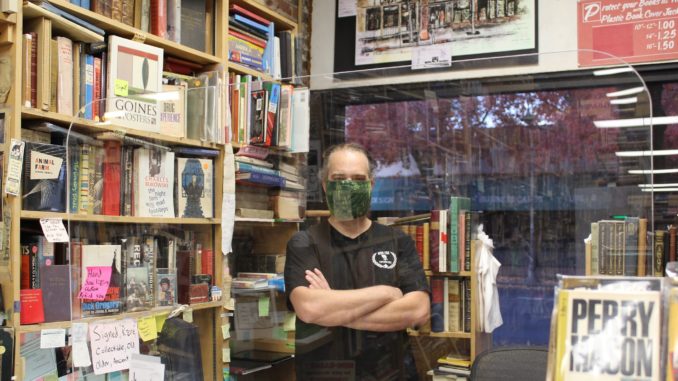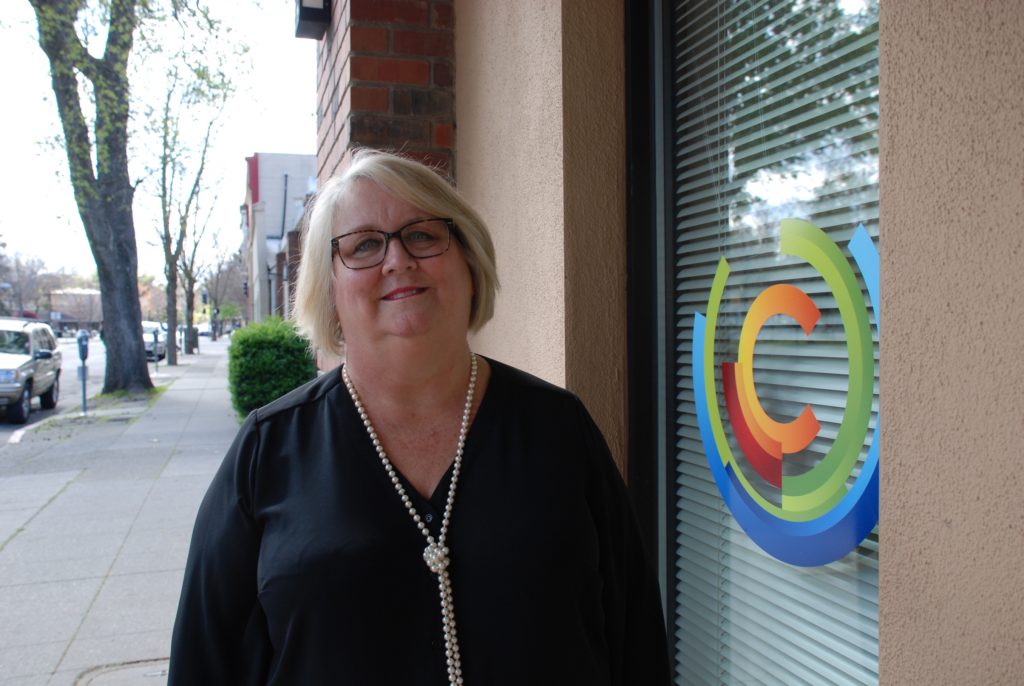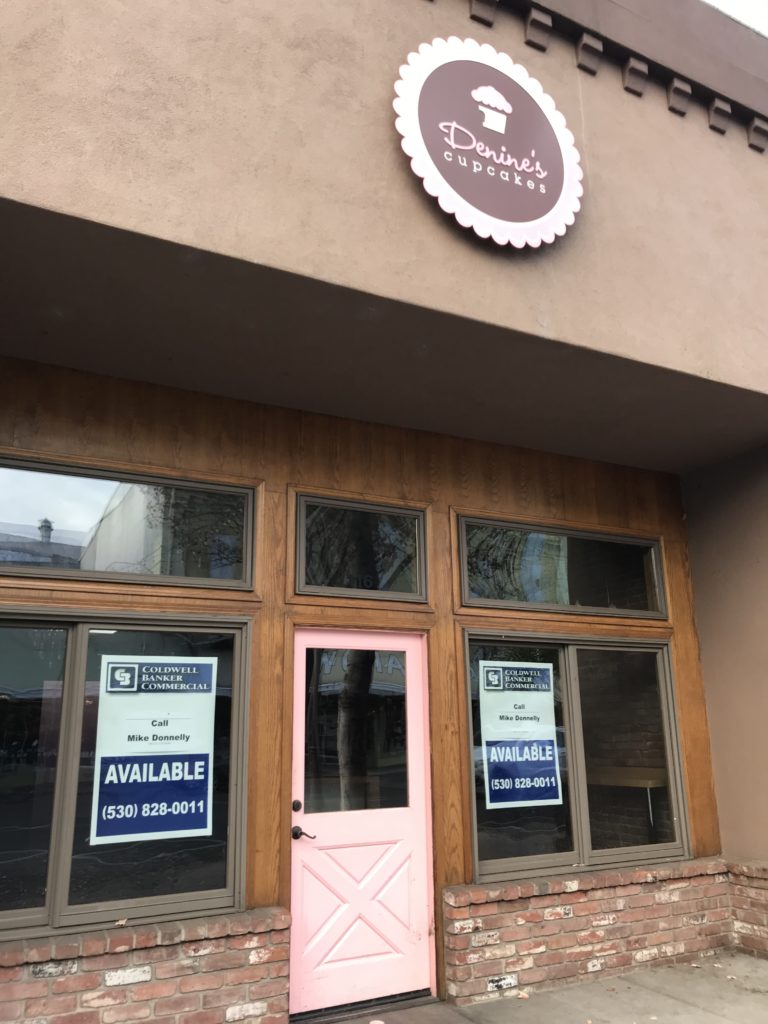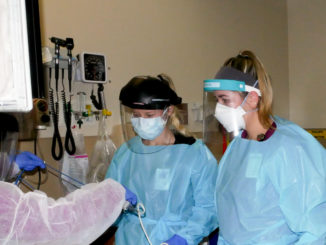
The day before Gov. Gavin Newsom announced a statewide lockdown in March, Josh Mills told the employees at his downtown shop The Bookstore to apply for unemployment. He’d decided to close temporarily, anticipating that the COVID-19 pandemic was going to get much worse before it got better.
Mills was right.
He didn’t know, however, that nine months later he’d still be struggling to make it through to the other side with his business intact. Indeed, the financial and emotional strain of the prolonged public health crisis has cast a shadow of uncertainty on the future of many local establishments.
The city of Chico and stakeholder groups such as the Downtown Chico Business Association (DCBA), 3CORE and the Chico Chamber of Commerce are working to help establishments weather the storm, but their efforts in most cases cannot offset the losses. Many businesses have survived thus far due to government assistance in the form of grants and loans, such as those provided through the federal Paycheck Protection Program (PPP) of the CARES Act. The rub is that the PPP ended in August; businesses largely have exhausted the funds and Congress has yet to come to a consensus on a second round of aid.
Katy Thoma, president and CEO of the Chico Chamber of Commerce, said the unknowns are exacerbating the stress.
“Nobody has a crystal ball,” she said. “I am very concerned there are businesses that aren’t going to make it. Because I don’t know—how long do they have to go before there’s a light at that end of the tunnel?”
Nationwide, more than 160,000 businesses closed from March 1 to August 31 this year, according to Yelp’s Local Economic Impact Report for September 2020. Of those businesses, Yelp reports that 60 percent (97,966) are permanently closed.
Helping hands
In the era of COVID-19, Thoma said the chamber has become a one-stop shop for information on how to remain sustainable, including financial resources, customer retention tips, understanding ordinances and laws, and navigating payroll requirements.

The chamber recognized that many small businesses don’t have the luxury of dedicated human resources, legal and marketing departments, and that’s where the organization could step in, Thoma said.
“We wanted to be the go-to place for information for small-business owners,” she said.
Meanwhile, Melanie Bassett, executive director of the DCBA, said the pandemic prompted her organization to launch a long-considered venture.
With a specialized loan from 3CORE, a nonprofit economic-development corporation that serves businesses, the DCBA created the Downtown Chico Online Marketplace in time for the holiday season. It’s an online portal that curates a variety of downtown business and restaurant offerings all in one place, designed to make it easier and more efficient for people to shop locally.
Only 34 percent of downtown businesses had an online presence before the DCBA launched the initiative, Bassett noted. Now, about two-thirds are online.
The DCBA recognized that shopping locally this holiday season is more significant than ever, Bassett said. Sales during this time can make up nearly a quarter of a business’ yearly revenue.
“It’s important for our community and it’s important for those businesses to stay open and be successful,” she said. “It’s been a rough year for them.”
The DCBA also has worked closely with the city of Chico to roll out changes that help its members adapt to social distancing. The City Council approved expanded outdoor dining via parklets, which have allowed restaurants to use portions of the streets for seating. Retailers and restaurants also can reserve parking spaces for curbside pickup and takeout options. Until recently, the city waived parking fees throughout downtown. Several major parking lots still offer free parking.
Interestingly, the city’s coffers—funded primarily through sales tax revenues—are in better shape than anticipated, Administrative Services Director Scott Dowell told the CN&R.
“We know that, unfortunately, the restaurants have been hurt, and I think everyone understands that. But car sales and some of the retail businesses that generate sales tax, those have continued to do OK and better than what was projected,” he said.
Several restaurants in Chico have closed their doors since the pandemic and appear to be the first to feel the impacts. This mirrors a national trend (see sidebar page 10).
Thousands of eateries in the country have shuttered, and absent additional financial assistance, those in the industry anticipate another wave of closures.
Trying to adapt
Thoma described businesses as having “whiplash” from constantly shifting their operations to follow the latest health and safety regulations due to fluctuating local infection rates.
Last month, Butte County jumped two tiers on the state’s ranking system, the Blueprint for a Safer Economy. The shift was dramatic, requiring reduced indoor capacity for the retail sector and a halt of all indoor dining services.

When do you cut your losses? That’s a question many Chico business owners have unfortunately had to ask themselves this year, Thoma said. In fact, she recalled a recent conversation with a businessman considering doing that very thing and going to work for another company.
Despite her concerns, Thoma remains optimistic. She has seen many businesses adapt by modifying their services or offering more products—such as masks and other personal protective equipment and hand sanitizers.
“Chico’s DNA, in my opinion, has an entrepreneurial spirit,” she said.
Bassett said some businesses have simply been in a holding pattern. For others, “pivot” seems to be the operative word in 2020. That includes the DCBA, whose employees are working from home while the office is temporarily closed.
“I think it’s hard for our businesses to try to maneuver—the back and forth and trying to plan and survive—but also not just survive but be successful,” she said. “You also just wonder how long that stimulus money can help sustain our businesses. Nobody imagined that it was going to last this long.”
Mills at The Bookstore received federal assistance via a PPP loan, but that covered just over eight weeks of operations. The shop also was awarded a small grant through the county’s Butte Business Stabilization Program, funded through the federal Coronavirus Relief Fund (also part of the CARES Act) and administered locally by 3CORE. However, that mainly will help optimize safety measures—such as adding additional air filters—pay off some debt and perhaps rehire a few employees.
Mills is all too familiar with taking drastic measures to stay afloat.
The Bookstore has closed and reopened multiple times due to government-mandated restrictions. To survive, Mills launched curbside service and expanded online ordering. Still, he estimates that the store’s income has been halved since the pandemic, which forced him to cash out a chunk of his retirement.
“I can’t believe we’re still here,” Mills said. “We’ve kind of just scraped by.
“If we can just make it through to the other side of this, I think it’ll be great again. For now, we’re just trying to keep the lights on.”
For more on this issue, read Planning, adapting, closing.
Holiday shopping: A physically distant option for shopping downtown this season is available via the Downtown Chico Online Marketplace:
shop.downtownchico.com




Be the first to comment